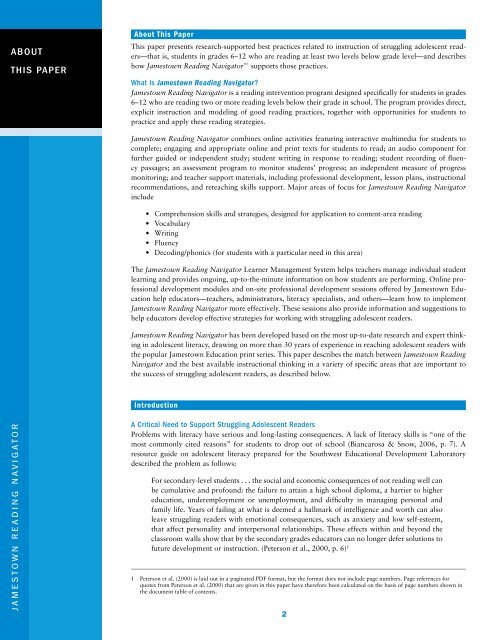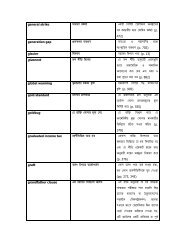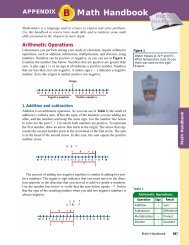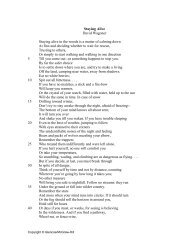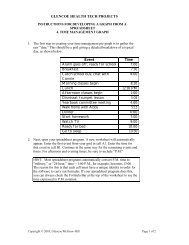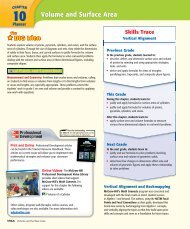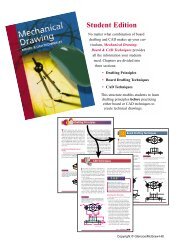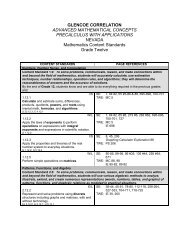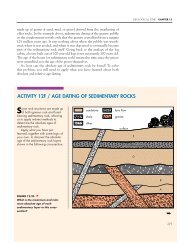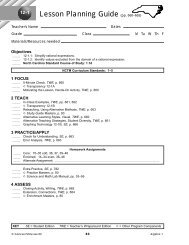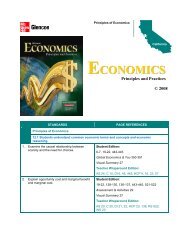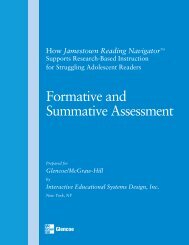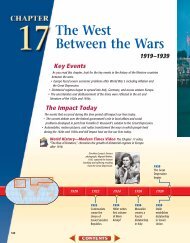Comprehension - Research
Comprehension - Research
Comprehension - Research
Create successful ePaper yourself
Turn your PDF publications into a flip-book with our unique Google optimized e-Paper software.
About<br />
this Paper<br />
About This Paper<br />
This paper presents research-supported best practices related to instruction of struggling adolescent readers—that<br />
is, students in grades 6–12 who are reading at least two levels below grade level—and describes<br />
how Jamestown Reading Navigator supports those practices.<br />
What Is Jamestown Reading Navigator?<br />
Jamestown Reading Navigator is a reading intervention program designed specifically for students in grades<br />
6–12 who are reading two or more reading levels below their grade in school. The program provides direct,<br />
explicit instruction and modeling of good reading practices, together with opportunities for students to<br />
practice and apply these reading strategies.<br />
Jamestown Reading Navigator combines online activities featuring interactive multimedia for students to<br />
complete; engaging and appropriate online and print texts for students to read; an audio component for<br />
further guided or independent study; student writing in response to reading; student recording of fluency<br />
passages; an assessment program to monitor students’ progress; an independent measure of progress<br />
monitoring; and teacher support materials, including professional development, lesson plans, instructional<br />
recommendations, and reteaching skills support. Major areas of focus for Jamestown Reading Navigator<br />
include<br />
• <strong>Comprehension</strong> skills and strategies, designed for application to content-area reading<br />
• Vocabulary<br />
• Writing<br />
• Fluency<br />
• Decoding/phonics (for students with a particular need in this area)<br />
The Jamestown Reading Navigator Learner Management System helps teachers manage individual student<br />
learning and provides ongoing, up-to-the-minute information on how students are performing. Online professional<br />
development modules and on-site professional development sessions offered by Jamestown Education<br />
help educators—teachers, administrators, literacy specialists, and others—learn how to implement<br />
Jamestown Reading Navigator more effectively. These sessions also provide information and suggestions to<br />
help educators develop effective strategies for working with struggling adolescent readers.<br />
Jamestown Reading Navigator has been developed based on the most up-to-date research and expert thinking<br />
in adolescent literacy, drawing on more than 30 years of experience in reaching adolescent readers with<br />
the popular Jamestown Education print series. This paper describes the match between Jamestown Reading<br />
Navigator and the best available instructional thinking in a variety of specific areas that are important to<br />
the success of struggling adolescent readers, as described below.<br />
Introduction<br />
J a m e s t o w n R e a d i n g N a v i g a t o r<br />
A Critical Need to Support Struggling Adolescent Readers<br />
Problems with literacy have serious and long-lasting consequences. A lack of literacy skills is “one of the<br />
most commonly cited reasons” for students to drop out of school (Biancarosa & Snow, 2006, p. 7). A<br />
resource guide on adolescent literacy prepared for the Southwest Educational Development Laboratory<br />
described the problem as follows:<br />
For secondary-level students . . . the social and economic consequences of not reading well can<br />
be cumulative and profound: the failure to attain a high school diploma, a barrier to higher<br />
education, underemployment or unemployment, and difficulty in managing personal and<br />
family life. Years of failing at what is deemed a hallmark of intelligence and worth can also<br />
leave struggling readers with emotional consequences, such as anxiety and low self-esteem,<br />
that affect personality and interpersonal relationships. These effects within and beyond the<br />
classroom walls show that by the secondary grades educators can no longer defer solutions to<br />
future development or instruction. (Peterson et al., 2000, p. 6) <br />
Peterson et al. (2000) is laid out in a paginated PDF format, but the format does not include page numbers. Page references for<br />
quotes from Peterson et al. (2000) that are given in this paper have therefore been calculated on the basis of page numbers shown in<br />
the document table of contents.


